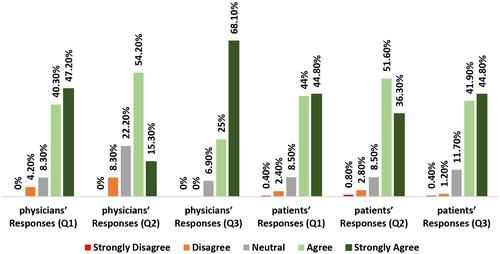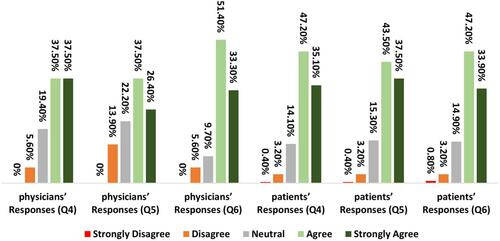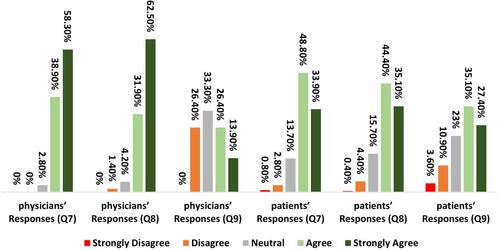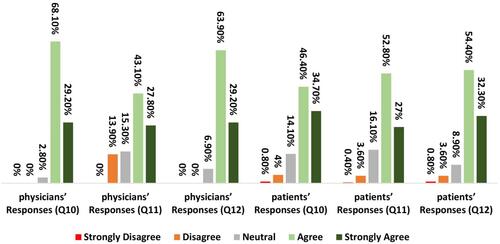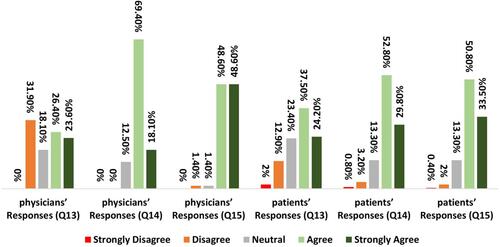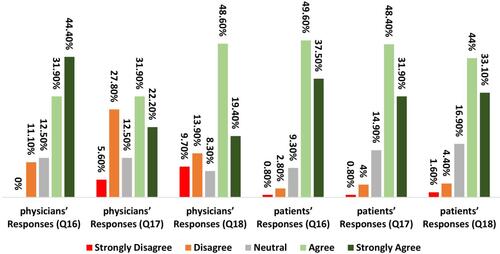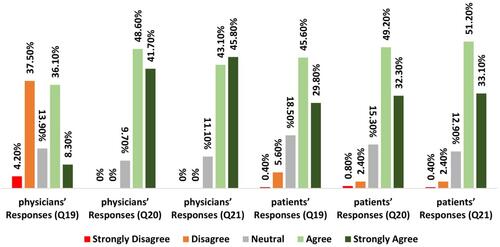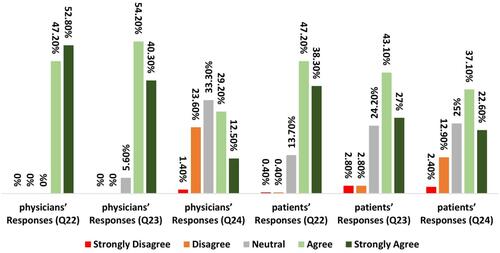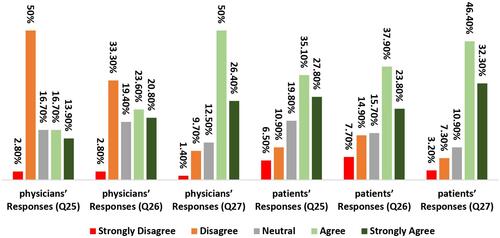Abstract
Purpose
The COVID-19 pandemic has affected physician–patient communication (PPC) in multiple ways. This study aims to report on the impact of physician–patient communication (PPC) skills on COVID-19 patients’ psychology in Jordan.
Sample and Methods
In this study, two questionnaires were designed. The first questionnaire targeted physicians, with 72 responses, and the second questionnaire targeted patients, with 248 responses. Both questionnaires contained common sections covering nine aspects of communication such as empathy, honesty, optimism, simple and deliberateness.
Results
This study found that the psychological effect of physicians’ positive communication skills on COVID-19 patients is significant. There were almost statistical agreement between physicians’ and patients’ questionnaire responses that the physicians’ communication skills have positively affected the patients’ psychological status; all patients’ responses confirmed this finding.
Conclusion
Based on this study’s findings, appropriate and continuous training will advance physicians’ communication skills in the form of exercises that could be as simple as class- or lecture-based activities, or using technology-based learning. Using a protocol or handbook to guide such communication is another essential strategy to enhance physician–patient communication (PPC). The study recommends that physicians must be aware that PPC skills required may vary depending on whether they are dealing with a pandemic or non-pandemic situation. Generally, appropriate or positive communication skills are considered one of the main factors effecting patients’ psychological responses to their diagnosis.
Introduction
Coronavirus disease-2019 (COVID-19) is a human disease caused by the novel coronavirus (SARS-CoV-2 or HCoV-19), which was first reported in December 2019. The World Health Organization (WHO) declared COVID-19 a public health emergency in January 2020,Citation1 and a pandemic on March 11, 2020. It is worth mentioning that at that stage the infection rates of asymptomatic infections were relatively high, and infections among children and young adults were relatively low.Citation2 Hence, having future incidence prediction tools like mathematical modelling is vital in forecasting the spread of COVID-19 to ultimately protect the healthcare systems in different countries all over the globe.Citation3 Caring for COVID-19 patients encompasses the risk of healthcare workers becoming infected, which may predispose them to psychological concerns, such as anxiety, depression, and burnout.Citation4,Citation5 Medical trainees who were exposed to COVID-19 patients reported statistically significant incidences of higher stress levels.Citation6
Further, 34.8% of the nurses and 41.6% of the physicians caring for COVID-19 patients experience sleep disturbances.Citation7 To protect medical practitioners and minimize their exposure to COVID-19, several institutions shifted to using Telemedicine and virtual services to sustain the care continuum by screening suspected patients whilst maintaining adequate distance.Citation8. Despite Telemedicine’s benefits, healthcare workers acknowledge that while some patients may report satisfaction, others may take longer to adjust to this communication method.Citation9 One proposed Telemedicine approach is based on Artificial Intelligence techniques, such as deep learning for text processing and genetic algorithms.Citation10 Another example is a cloud-based framework to reduce adverse mental health effects of COVID-19 among seafarers.Citation11
The first COVID-19 case in Jordan was registered at the beginning of March 2020 in a Jordanian citizen returning from Italy. A state of emergency was declared in Jordan on March 19, 2020. At that time, the Jordanian government imposed home confinement instructions and movement restrictions. By the end of March 05, 2021, the Jordanian Ministry of Health had reported 417,934 confirmed cases; and 4862 deaths.Citation1 According to the Jordanian Ministry of Health, on March 05, 2021, the number of active cases receiving hospital treatment for COVID-19 stood at 1931 patients; of whom 395 patients were in intensive care units (ICU). Further, 176 of these ICU patients were being supported by mechanical ventilation.Citation12 By the end of March 5, 2021, over 115289961 COVID-19 cases and 2,564,560 deaths had been reported globally to WHO.Citation12
Communication is conveying ideas, thoughts, feelings, and attitude, both verbally and nonverbally. There are two primary forms of contact: verbal and nonverbal—verbal refers to words, and nonverbal refers to all communication that occurs using body movements.Citation13 It is defined as “the transfer of information from one person to another, whether or not it elicits confidence”. However, the information transferred must be understandable to the receiver.Citation14 Having adequate communication skills is essential for personal success. In particular, physicians must maintain good communication skills to develop excellent physician–patient relationships.Citation14,Citation15 According to Reddy and Gupta,Citation16 several factors influence the acceptance of the communicated information, such as social, cultural, literacy levels, and religious beliefs. Inadequate physician communication skills are considered one of the main barriers to good communication in physician–patient interactions.Citation17,Citation18 According to Kee et al (2018), physicians who do not make appropriate eye contact, have negative facial expressions, fail to listen to patients, and speak in a threatening manner are considered to have a crucial communication skills gap.Citation19 Meanwhile, Ha and Longnecker (2010) mentioned patients’ anxiety and fear and unrealistic expectations as barriers for good communication.Citation20 Having competent communication skills comes with remarkable benefits. For instance, good communication will reduce emotional distress among patients, higher symptom resolution, better control of chronic diseases,Citation14 improved compliance and satisfaction,Citation18 and a reduced risk of medical malpractice claims.Citation21
The COVID-19 pandemic has transformed patient care; wearing personal protective equipment, maintaining distance and the use of Telemedicine may negatively affect physician–patient communication.Citation22 Back et al stipulated that physicians must review their communication skills in times of pandemic; as the pandemic hits the hospital’s resources of equipment and staff, every healthcare worker will feel short of time to talk to their patients; this is of importance, especially while communicating with the critically ill patients.Citation23 During a pandemic, patients become stressed, sensitive, and even stigmatized; therefore, healthcare professionals should be extremely cautious in selecting their terminology, method, and time of communication.Citation16 Finset et al recommended communicating openly and honestly, delivering consistent and specific information, and acknowledging emotional responses while communicating.Citation24 Further, keeping a patient–centered approach, shared decision-making and articulating care goals are necessary communicative elements during a pandemic.Citation25
Appropriate physician–patient communication is characterized by sharing information to give compassionate and empowering care provision, with sensitivity to patient needs.Citation26,Citation27 Several strategies can help physicians achieve this level of communication, such as assessing what the patient knows and what they want to know from both verbal and non-verbal signs to show empathy. Delivering information in small, simple pieces also helps to build patient trust.Citation21,Citation23 Physicians must also be aware of a patient’s cultural preferences regarding communication.Citation28 Appropriate and continuous training, either lecture-based or technology-based online modules, will advance physicians’ communication skills.Citation29 Using a protocol to guide communication is another essential strategy to enhance physician–patient communication. Several strategies are available for healthcare workers to select, according to the conversation context.
For instance, The SPIKES protocol (SPIKES: Setting; Perception; Invitation; Knowledge; Empathy; Summarizing) was found to be effective in communicating bad news with diverse populations.Citation30,Citation31 The CLASS protocol (Context, Listening, Acknowledge, Strategy, and Summary) is used for medical interviews. CONES (Context, Opening Shot, Narrative, Emotions, Strategy, and Summary) is used for discussing a medical error, while BUSTER (Be prepared, Use non-judgmental listening, the Six-second rule, Tell me more, Empathize and validate, and Respond with a wish statement) can be used to guide challenging conversations. Moreover, the EVE (Explore the Emotion, Validate the Emotion, and Empathic Response) is useful for any encounter where emotions present.Citation16
The current study aims to identify essential communication skills that are used between physicians and COVID-19 patients in Jordan. The study also aims to demonstrate the extent to which these skills differ from or coincide with communication around other diseases, given that this disease is considered a pandemic due to its rapid spread. In addition, it seeks to study the effect of communication skills, whether negative or positive, on the psychological aspect of COVID-19 patients. This approach highlights a key distinguishing feature of this study, in that it explores the differences between the communication skills required in pandemic situations and those used in non-pandemic conditions. Furthermore, it will demonstrate the psychological impact of those skills.
Materials and Methods
Study Design
This study is based on the descriptive-analytical method. It aims at identifying the critical communication skills used by a physician with a COVID-19 patient. It further uncovers the extent of a positive effect of such skills on a COVID-19 patient’s psychology. Two ÏNstitutional Review Board–approved electronic questionnaires were designed to collect the data, one for physicians and the other for COVID-19 patients (Supplementary Physician Questionnaire and Supplementary Patient Questionnaire). These questionnaires were then randomly distributed to physicians and COVID-19 patients as appropriate. Gender, age or an academic level were not taken into consideration in the study variables.
Participants
The study targeted 100 physicians treating coronavirus patients in Jordan and (300) COVID-19 patients during or after 14 days of infection by SARS-CoV-2 treated by physicians either as inpatients or outpatients. Seventy-two physicians (72%) responded, and 248 patients (82.6%) responded by completing the questionnaires.
Ethics
The Institutional Review Board (IRB) of the Specialty Hospital approved the study proposal with the approval № 103667/T/1/5 on 10/12/2020, and consent was obtained from all participants when the two questionnaires were distributed to COVID-19 patients and physicians who treat COVID-19 patients. It was explained to the physicians and patients that participation in this research was privacy-guaranteed and not obligatory. Participants were not asked to provide personal information such as their names, age, and education level. These criteria match the Declaration of Helsinki 1989.Citation32,Citation33 Both groups, physicians and patients, were informed that the questionnaire responses would be used for scientific research.
Data Collection Procedure
The data of the study were collected during December 2020, after ethical approval was obtained. In compliance with universal protocols to mitigate the pandemic’s spread, the questionnaires were sent via email and over social media platforms. Patients who were unable to complete the electronic questionnaire were interviewed by phone to collect their responses.
Research Instruments
The first questionnaire was directed to physicians, aiming to determine the physician’s communication skills with COVID-19 patients. It was built on 27 statements divided into nine sections (as shown in ). This questionnaire was created based on communication aspects listed from a previous report about patient–physician communication.Citation21
Table 1 The Nine Sections of the Questionnaire
The second questionnaire was directed to COVID-19 patients who had been treated as inpatients or outpatients. It aimed to measure the physicians’ communication skills in the nine topics used in the first questionnaire on COVID-19 patients’ psychology. Both questionnaires were rated on a 5-point Likert scale as shown in .
Table 2 Five-Point Likert Scale
To ensure the validity of the questionnaire, health and communication skills specialists reviewed the questionnaires to verify their statements. In addition, a pilot session was conducted on (5) physicians and (10) patients who did not take part in the overall study, to verify their understanding of the questionnaire paragraphs and inform the researchers of any issues they faced with its completion. This information was analyzed using Cronbach alpha (α) value to assess the questionnaire’s reliability coefficient factor. Both questionnaires reached a reliability coefficient factor (≥0.80), indicating statistical reliability at p-value (0.01) level, which means that both questionnaires are valid and reliable.
Data Analysis
All data collected through the study were converted from written to digital data. Subsequently, these data were analyzed according to the statistics nonparametric test (Kruskal–Wallis H) using the (IBM-SPSS v.26) program (Supplementary Raw Data).
Results
(first section) shows that physicians accepted pre-information and opinions from patients concerning their medical condition, but with no statistical significance at p-value (0.840). Patients also felt comfortable that the physicians were attentive and accepting of their information and opinions, which the p-value confirms at the level of (0.764). Generally, this indicates that there are no statistically significant differences between physicians’ responses and patients’ responses in this regard. However, the table does reveal statistically significant differences at p-value (0.001) between physicians’ responses and patients’ responses in Q2. This indicates that physicians have reservations about patients’ medical opinions (). The statistically significant differences confirm this among the physicians’ responses (Appendix A in the supplementary materials).
Table 3 General Trend of the Physicians’ and Patients’ Questionnaire Responses
(second section) shows that physicians agree to provide patients with information concerning their medical condition, positively affecting the patients’ psychological state by reducing fear and anxiety among patients. The p-value confirms this at the level of (0.070). There is no statistically significant difference between the responses of physicians and the reactions of patients. However, it shows explicitly that there is a statistically significant difference at the level of p-value (0.004) between responses of physicians and responses of patients in Q5, which means that physicians have reservations about the nature of the information requested by the patients (). The statistically significant differences confirm this among the physicians’ responses (Appendix B in the supplementary materials).
(third section) shows that physicians believe that they show sympathy towards patients, positively affecting the patients’ psychological state. Despite physicians and patients’ compatibility, there is a statistically significant difference at p-value (0.001), which indicates that physicians exaggerate sympathy with patients (). This is confirmed by statistically significant differences at p-value (0.001) among the physicians’ questionnaire responses (Appendix C in the supplementary materials).
(fourth section) shows that physicians believe that it is important to speak slowly and explain treatment procedures without overburdening the patient with test results. Patient responses confirm that this approach by physicians positively affects them. What affirms the compatibility of these results is the p-value at the level of (0.855). The responses of physicians and patients are not dispersed (). This is confirmed by statistically significant differences at p-value (0.032) among the physicians’ questionnaire questions (Appendix D in the supplementary materials).
(fifth section) shows that physicians agree to simplify the disease for patients, positively affecting the patients’ psychological state by reducing anxiety and stress, as confirmed by the statistically significant differences at p-value (0.778). However, there are differences in Q15 in particular, which demonstrates statistical significant at p-value (0.002) (Appendix E in the supplementary materials). also shows the dispersion of physicians and patients’ responses in Q13.
(sixth section) shows that physicians’ desire to be honest with patients regarding their medical condition is reflected in the patients’ responses. The table indicates that physicians’ honesty positively affects patients’ motivation, interest, and seriousness in dealing with physicians’ instructions and medical procedures. Despite the compatibility of physicians and patients, there is a statistically significant difference at p-value (0.000); also, there is a statistically significant difference at p-value (0.001) in Q17 between physicians’ and patients’ responses (). This is confirmed by the statistically significant differences at p-value (0.001) among the physicians’ questionnaire responses (Appendix F in the supplementary materials).
(seventh section) shows that physicians are willing to give patients hope and optimism, which enhanced the patient’s confidence in facing the disease. The compatibility of the two samples is shown in the lack of statistically significant difference between the two responses at p-value (0.185). However, there is a statistically significant difference in Q19. This is shown by the dispersion of the physicians’ responses (), which confirms the previous results of the statistically significant differences among the physicians’ questions (Appendix G in the supplementary materials).
(eighth section) shows that physicians indicated that their reaction towards patients is positive. Patients mirrored this, answering affirmatively about the positive psychological impact that physicians’ positive responses had on them, and the statistical significance was generally at p-value (0.698). The distribution of physicians’ responses observed in Q24 (), reflects statistically significant differences among the physicians’ questionnaire responses (Appendix H in the supplementary materials).
(ninth section) shows that physicians are neutral in showing adverse reactions to patients, however, the patients agreed on the negative psychological impact. This shows the two samples’ incompatibility, and it has been confirmed by a statistically significant difference at p-value (0.001) (Appendix I in the supplementary materials). This was also shown by the range of their responses ().
Discussion
Breaking negative news is a frustrating and yet inevitable feature of health care for physicians and patients alike. Although, as our review of the related literature has demonstrated, some approaches are considered better than others for breaking bad news. This study explores the beneficial impacts of physicians’ positive communication strategies on the psychological wellbeing of COVID-19 patients. In brief, this study’s findings implied the following: COVID-19 patients felt comfortable when getting the physician’s attention and affection, which increased their confidence in the medical procedures. In addition, physicians’ emotional involvement increased patients’ self-confidence and comfort. It reduced their anxiety and stress, and lastly, patients were less likely to receive treatment and accept their health situation when the physicians’ opinions were perceived as negative.
The results of section one of the physicians’ questionnaire in and (first section) showed that physicians are generally able to accept patients’ presentation and interpretation of their symptoms; pre-information was general chat about the patient, including his/her opinion about her or his medical condition. However, some physicians expressed reservations regarding patients’ medical beliefs because they believe that medical opinions can come only from qualified persons such as physicians, pharmacists, nurses, et cetera. Besides which, the pre-information included advice from the physician to the patient to reject any unspecialized information propagated via social media. Findings from the first section of the patients’ questionnaires correlated with this, suggesting that patients also experienced acceptance of their pre-information given.
The second section was about the skills of physicians to effectively communicate scientific and medical information about COVID-19. The results of section 2 in and , (second section) showed physicians’ general ability to communicate medical information and statistics about COVID-19 with their patients. Some physicians expressed reservations regarding the value of sharing such information with patients because they believe that pandemic diseases are not fully understood, meaning information has to be shared with the public carefully. From the patients’ point of view, section two showed that physicians’ skills in communicating medical and statistical information about COVID-19 with them had a positive impact. This concurs with a previous study of Finset and his colleagues in terms of the importance of clear physician-to-patient communication as a key factor to fight the pandemic of COVID-19.Citation24
The third section was about physicians’ interpersonal skills; wearing a friendly expression, using polite phrases and sitting beside the patients. The results of section 3 in ) and , (third section) revealed a positive trend toward using polite and friendly expressions when talking with patients. However, physicians’ reactions towards sitting beside their patients were ambivalent. This might be because the physicians are aware of the infectious nature of COVID-19. Findings from patients also demonstrated that physicians adopting a polite and friendly manner elicited positive responses and emotions whilst they found their physician’s body posture reassuring. However, not all patients were impacted in this way; possibly due to the patients’ complicated medical condition and negative feedback about the disease the patients got from social media. The findings of the third section echoed a previous descriptive, qualitative study in terms of the importance of an empirically derived model of an empathic communication by clinicians with practical implications.Citation34
The fourth section of the physicians and the patients’ questionnaire was about physicians’ skill of using slow and deliberate speech when talking to patients. In and , (fourth section), the physicians showed a strong positive preference for talking slowly to patients, and not burdening them with details of medical tests and treatment. However, some physicians prefer to explain medical reports and laboratory results comprehensively. This may be because physicians are keen to provide patients with all the details related to their disease to reassure them that the patients are getting the correct information about the condition. Patients indicated that they responded positively to physicians’ use of slow and deliberate speech. This finding of the fourth section was in agreement with a previous study of Travaline et al in terms of the importance of that slow down communication provide enough time for patients to absorb new information.Citation21
The fifth section of the questionnaire was about the impact of physicians’ ability to communicate test results clearly, using ordinary and simple phrases. and (fifth section) demonstrate how the physicians were inclined towards simplifying the patients’ disease. From the patients’ point of view, this approach was helpful to them. This finding of the fifth section was in agreement with previous reports regarding the importance of physicians to avoid long monologues and to keep to short and simple communication statements.Citation21,Citation35
The sixth section explored the physician’s level of honesty concerning how COVID-19 symptoms develop, and around treatment when talking to patients. In and (sixth section), the physicians showed a generally positive trend toward honestly managing the COVID-19 cases. However, some physicians preferred not to be entirely honest with patients with regard to the possible severity of the disease’s symptoms, as this could trigger panic in patients about their health conditions. Among patients’ however, there was a clear preference indicated for frankness and sympathy from the physician, which substantially impacted patients in the pandemic. This finding of the sixth section was in agreement with previous reports emphasizing the role of verified information in preventing the COVID-19 as a panic disease.Citation21,Citation36
The seventh section explored the physicians’ skills in giving hope and optimism to patients. The physicians’ responses ascribed considerably more importance to providing hope and optimism to COVID-19 patients, than patients’ responses did. It is noteworthy that the physicians were neutral with regards to the value of downplaying the disease symptoms when talking to patients. This is possibly because some physicians prefer not to minimize the severity of the symptoms lest the patients show a lack of concern for the seriousness of the disease ( and , seventh section).
Section eight dealt with physicians’ positive ability to create optimism with patients through means such as sharing happiness if a patient’s condition improves, maintaining eye contact with the patient during the consultation, and respecting social distancing while comforting the patients. The physicians’ indicated that they aim to do all of these, while patients’ responses expressed appreciation of the physicians’ positive efforts in this regard () and (, eighth section). This finding of the eighth section was in agreement with a previously mentioned report highlighting that an attentive physician will most probably have more satisfied patient.Citation21
The ninth section explored the impact of the physicians’ negative interactions with patients, which were defined as using firm language with patients who were not seen to be responding to instructions, allowing physicians’ work stress to impact communication with patients, and the effect of physicians being distracted by outside influences such as people or the telephone during consultation with patients. The physicians adopted an overall neutral stance towards these behaviours () and (, ninth section). However, patients reported much stronger negative reactions to such behaviors, with no statistical significance between the two responses.
As COVID-19 is a pandemic disease and different from other conditions, it affects physician–patient communication (PPC). This study examined the psychological effects of Physicians’ Communication skills on patients’ responses and behavior. Stigmatizing culture might have affected the findings of the study. This study was limited by the fact that there are few respiratory tract specialists in Jordan, which has affected our statistical sample of physicians in this survey. The small population sample of patients in this survey was 248, which might have influenced this study’s statistical power as larger sample represents the whole population statistically better. Furthermore, the surveys in this study were only administered digitally, via google forms; a face-to-face survey is more interactive and may have yielded more accurate data, as some patients in this area (developing countries) may be unfamiliar with digital technology, which might have affected their ability to properly fill in the questionnaire. The population of this study was focused geographically on Amman since there is no available demographic database for either patients or physicians in other cities in Jordan. On the other hand, it should be noted that approximately two-thirds of Jordan’s total population live in the capital city, Amman. It is recommended that the pandemic medical protocols in Jordan be updated based on this study’s findings by building an empirical derived model of physicians` empathic skills of communication with an ability to explore the unexpressed feeling by patients.
Conclusion
Word selection, range and extent of information provided, language patterns, posture and facial expressions can significantly affect communication quality between physician and patient. To a large extent, this is a conscious choice that a physician makes, to learn and adapt to individual patients in clinical situations. Avoiding communication errors using jargon, not being available to patients, not showing empathy in communication, and being a good listener to patients is highly recommended, and as the results have shown, highly beneficial. Arguably, these skills are not fully developed after completing medical studies or residency. Developing and maintaining a range of communication skills takes time and constant practice. The essential communication elements can help lead to more productive physician–patient meetings and better overall clinical outcomes. This study’s findings can be recommended for inclusion by the Health Policy Makers at the Ministry of Health in a Continuous Medical Education (CME) handbook, or guideline of physician–patient communication skills (PPCs). A two-way communication system is also recommended to include both physician to patient, and patient to physician, taking into consideration the psychological effects of both ways. We have to keep in mind that during pandemics, the patients might fear being stigmatized or discriminated against, which could adversely affect the patient-to-physician communication.
Acknowledgments
The authors would like to acknowledge the support provided by the German Jordanian University, Amman, Jordan. The authors also are grateful to everyone who took the time to complete our questionnaires, both physicians and patients. We would also like to thank the Specialty Hospital for their assistance in distributing the questionnaires and the specialists who reviewed the questionnaires.
Disclosure
The authors report no financial or other conflicts of interest in this work.
References
- WHO. Timeline of WHO’s Response to COVID-19; 2020.
- Bulut JC, Kato Y. Epidemiology of COVID-19. Turkish J Med Sci. 2020;50(SI–1):563–567. doi:10.3906/sag-2004-172
- Stübinger J, Schneider L. Epidemiology of Coronavirus COVID-19: forecasting the future incidence in different countries. Healthcare. 2020;8:99. doi:10.3390/healthcare8020099
- Kontoangelos K, Economou M, Papageorgiou C. Mental health effects of COVID-19 pandemia: a review of clinical and psychological traits. Psychiatry Investig. 2020;17:491–505. doi:10.30773/pi.2020.0161
- Park SY, Kim B, Jung DS, et al. Psychological distress among infectious disease physicians during the response to the COVID-19 outbreak in the Republic of Korea. BMC Public Health. 2020;20:1811. doi:10.1186/s12889-020-09886-w
- Kannampallil TG, Goss CW, Evanoff BA, et al. Exposure to COVID-19 patients increases physician trainee stress and burnout. PLoS One. 2020;15(8):e0237301. doi:10.1371/journal.pone.0237301
- Salari N, Khazaie H, Hosseinian-Far A, et al. The prevalence of sleep disturbances among physicians and nurses facing the COVID-19 patients: a systematic review and meta-analysis. Global Health. 2020;16:92.
- Chou E, Hsieh YL, Wolfshohl J, Green F, Bhakta T. Onsite telemedicine strategy for coronavirus (COVID-19) screening to limit exposure in ED. Emerg Med J. 2020;37:335–337. doi:10.1136/emermed-2020-209645
- Bains J, Greenwald PW, Mulcare M, et al. Utilizing telemedicine in a novel approach to COVID-19 management and patient experience in the emergency department. Telemed e-Health. 2020. doi:10.1089/tmj.2020.0162
- Battineni G, Pallotta G, Nittari G, Amenta F. Telemedicine framework to mitigate the impact of the COVID-19 pandemic. J Taibah Univ Med Sci. 2021. doi:10.1016/j.jtumed.2020.12.010
- Mittal M, Battineni G, Goyal LM, et al. Cloud-based framework to mitigate the impact of COVID-19 on seafarers’ mental health. Int Marit Health. 2020;71:213–214. doi:10.5603/IMH.2020.0038
- WHO. Coronavirus Disease (COVID-19) Situation Reports. (2021).
- Patel DS. Body Language: An Effective Communication Tool. 2015.
- Wong SY, Lee A. Communication skills and doctor patient relationship compliance with medical treatment. Med Bull. 2006;11.
- Street RL, Gordon H, Haidet P. Physicians’ communication and perceptions of patients: is it how they look, how they talk, or is it just the doctor? Soc Sci Med. 2007;65:586–598. doi:10.1016/j.socscimed.2007.03.036
- Reddy B, Gupta A. Importance of effective communication during COVID-19 infodemic. J Fam Med Prim Care. 2020;9:3793.
- Bardosono S, Pansawira P, Ratih MP. Effective communication skill: doctor – patient consultation. World Nutr J. 2018;2:2580–7013. doi:10.25220/WNJ.V02.i1.0007
- Biglu M, Nateqv F, Ghojazadeh M, Asgharzadeh A. Communication skills of physicians and patients’ satisfaction. Mater Socio Medica. 2017;29:192.
- Kee JWY, Khoo HS, Lim I, Koh MYH. Communication skills in patient-doctor interactions: learning from patient complaints. Heal Prof Educ. 2018;4:97–106.
- Ha JF, Longnecker N. Doctor-patient communication: a review. Ochsner J. 2010;10:38–43.
- Trayaline JM, Ruchinskas R, D’Alonzo GE. Patient-physician communication: why and how. J Am Osteopathic Assoc. 2005;105:13–18.
- Ghosh A, Sharma K, Choudhury S. COVID-19 and physician–patient relationship: potential effects of ‘masking’, ‘distancing’ and ‘others’. Fam Pract. 2020. doi:10.1093/fampra/cmaa092
- Back A, Tulsky JA, Arnold RM. Communication skills in the age of COVID-19. Ann Intern Med. 2020;172:759–760. doi:10.7326/M20-1376
- Finset A, Bosworth H, Butow P, et al. Effective health communication – a key factor in fighting the COVID-19 pandemic. Patient Educ Couns. 2020;103:873–876. doi:10.1016/j.pec.2020.03.027
- Rubinelli S, Myers K, Rosenbaum M, Davis D. Implications of the current COVID-19 pandemic for communication in healthcare. Patient Educ Couns. 2020;103:1067–1069. doi:10.1016/j.pec.2020.04.021
- Constand MK, MacDermid JC, Dal Bello-Haas V, Law M. Scoping review of patient-centered care approaches in healthcare. BMC Health Serv Res. 2014;14:271. doi:10.1186/1472-6963-14-271
- Zill JM, Christalle E, Müller E, et al. Measurement of physician-patient communication-a systematic review. PLoS One. 2014;9:12. doi:10.1371/journal.pone.0112637
- ACOG. Effective Patient–Physician Communication. Available from: https://www.acog.org/clinical/clinical-guidance/committee-opinion/articles/2014/02/effective-patient-physician-communication. Accessed March 29, 2021.
- Sun C, Zou J, Zhao L, et al. New doctor-patient communication learning software to help interns succeed in communication skills. BMC Med. Educ. 2020;20:8. doi:10.1186/s12909-019-1917-z
- Marschollek P, Bąkowska K, Bąkowski W, Marschollek K, Tarkowski R. Oncologists and breaking bad news—from the informed patients’ point of view. The evaluation of the SPIKES protocol implementation. J Cancer Educ. 2019;34:375–380. doi:10.1007/s13187-017-1315-3
- Milton AC, Mullan B. Views and experience of communication when receiving a serious mental health diagnosis: satisfaction levels, communication preferences, and acceptability of the SPIKES protocol. J Ment Heal. 2017;26:395–404. doi:10.1080/09638237.2016.1207225
- World Medical Association. World Medical Association Declaration of Helsinki. JAMA. 2013;310:2191.
- WMA The World Medical Association. Declaration of Helsinki 1989. Available from: https://www.wma.net/what-we-do/medical-ethics/declaration-of-helsinki/doh-sept1989/. Accessed January 23, 2021.
- Suchman ALA. Model of empathic communication in the medical interview. JAMA. 1997;277:678. doi:10.1001/jama.1997.03540320082047
- Mostofsky E, Dunn JA, Hernández-Díaz S, Mittleman MA. Patient and physician preferences for reporting research findings. Fam Med. 2019;51:502–508. doi:10.22454/FamMed.2019.400835
- The Lancet. COVID-19: fighting panic with information. The Lancet. 2020;395:537.

